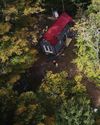
He's surrounded on all sides by an arsenal of machines for creating music: a MIDI controller keyboard, four keyboards stacked in racks of two, and an organ, while a bass cabinet, guitar amp, drum kit, and percussion section fill out the rest of the cramped basement. All of these run through five interfaces which route 40 signals-eight apiece-into the 21-year-old jazz musician's computer. It sits at the helm of this tightly organized chaos.
While chatting on a video call, Whitaker flits around a sea of dials, sliders, LED displays, and keys, like a pilot in the cockpit of a jumbo jet. A turn of a knob here, a click there, then his fingers turn to their true love: the piano keys. He grins while they dash across the keyboard, producing a raucous, cheeky major-key run. The piano is an extension of Whitaker: When he's particularly excited, or laughs, his hands dart across the keys, creating short melodic trills and riffs.
This basement is where Whitaker records and produces his music. But he doesn't use home production software or mixing boards the same way that sighted musicians do. He's blind, and has been since he was an infant-a result of complications from being born prematurely at 24 weeks.
Now at 21 and entering his fourth year at New York City's esteemed Juilliard School, he's an established recording and performing artist, a Gen Z jazz wunderkind with three full-length records under his belt and collaborations with jazz veterans like Christian McBride, Rhoda Scott, and the late Dr. Lonnie Smith. He's driven and he values control over his creative process, but for most people, recording music in the digital age is as much a visual process as a musical one. Playing, recording, mixing-all of these are carried out on visual cues, especially on a computer screen.
So how does Whitaker do it without sight? With a nod to Sinatra, Whitaker does it his way.
Denne historien er fra September - October 2022-utgaven av Popular Mechanics US.
Start din 7-dagers gratis prøveperiode på Magzter GOLD for å få tilgang til tusenvis av utvalgte premiumhistorier og 9000+ magasiner og aviser.
Allerede abonnent ? Logg på
Denne historien er fra September - October 2022-utgaven av Popular Mechanics US.
Start din 7-dagers gratis prøveperiode på Magzter GOLD for å få tilgang til tusenvis av utvalgte premiumhistorier og 9000+ magasiner og aviser.
Allerede abonnent? Logg på

ONE OF THE 'GREATEST THREATS' TO THE PACIFIC NORTHWEST ISN'T WHAT YOU THINK.
EXPERTS ARE PREPARING THE REGION AGAINST THE THREAT OF DANGEROUS VOLCANIC MUDFLOWS, KNOWN AS LAHARS, WHICH COULD INUNDATE THE COMMUNITIES SURROUNDING MT. RAINIER IN AS LITTLE AS 30 MINUTES.

THE WORLD'S TOUGHEST ROW
They rowed 3,000 miles across the Atlantic, battling unpredictable weather, chaotic seas, and finicky equipment. But what they discovered gave them profound new insights into the power of the ocean.

HOW TO DIY OFF-GRID SOLAR
SPEND THE TIME UP FRONT AND PLAN IT CAREFULLY TO AVOID DISAPPOINTMENT

Are We on the Verge of an ARMS RACE in SPACE?
RUMORS OF A RUSSIAN SPACE NUKE, ALONG WITH OTHER SATELLITE-TARGETING WEAPONS, HAVE MADE GEOPOLITICAL TENSIONS EXTEND INTO ORBIT.

Fresh Fingerprints on an Ancient Statue
A CLAY FIGURINE HAS SPENT MILLENNIA incomplete, waiting at the bottom of a lake for its long-dead craftsman to finish the Iron Age-era statuette.

Quantum Entanglement in Our Brains
IT HAS LONG BEEN ARGUED THAT THE human brain is similar to a computer. But in reality, that's selling the brain pretty short.

The Tools of Copernicus
WAY BACK IN 1508, WITH ONLY LIMited tools at his disposal, Nicolaus Copernicus developed a celestial model of a heliocentric planetary system, which he described in hist landmark work De revolutionibus orbium coelestium. It was a complete overhaul of our conception of the universe-one that, unfortunately, earned him the ire of the Catholic church for decades after his death-and forever changed the way we look at the stars.

Building a Sixth-Generation Bomber Raptor
THE GLOBAL COMBAT AIR Programme (GCAP)-a project by the U.K., Italy, and Japan to develop a sixth-generation stealth fighter-has been busy at the drawing board reshaping its vision of the future of air warfare. And judging by the new concept model unveiled at this year's Farnborough air show, that future has big triangular wings.

The Electroweak Force of the Early Universe
TODAY, THE UNIVERSE AS WE KNOW IT IS governed by four fundamental forces: the strong nuclear force, the weak nuclear force, electromagnetism, and gravity.

This Ancient Fossil With a Brain and Guts
WE KNOW WHAT FOSSILS LOOK like. For example, typical dinosaur fossils are bones turned to stone and preserved from the passage of time, located, if we're particularly lucky, in large collections that can be reassembled to represent the beast they used to prop up in their entirety.